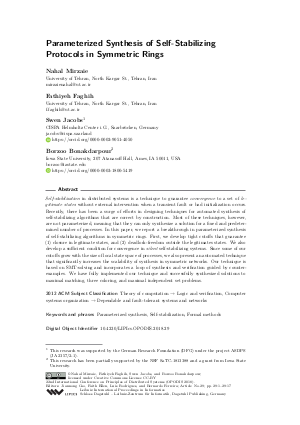Parameterized Synthesis of Self-Stabilizing Protocols in Symmetric Rings
Authors
Nahal Mirzaie,
Fathiyeh Faghih,
Swen Jacobs  ,
Borzoo Bonakdarpour
,
Borzoo Bonakdarpour 
-
Part of:
Volume:
22nd International Conference on Principles of Distributed Systems (OPODIS 2018)
Part of: Series: Leibniz International Proceedings in Informatics (LIPIcs)
Part of: Conference: International Conference on Principles of Distributed Systems (OPODIS) - License:
 Creative Commons Attribution 3.0 Unported license
Creative Commons Attribution 3.0 Unported license
- Publication Date: 2019-01-15
File

PDF
LIPIcs.OPODIS.2018.29.pdf
- Filesize: 0.5 MB
- 17 pages
Document Identifiers
Subject Classification
ACM Subject Classification
- Theory of computation → Logic and verification
- Computer systems organization → Dependable and fault-tolerant systems and networks
Keywords
- Parameterized synthesis
- Self-stabilization
- Formal methods
Metrics
- Access Statistics
-
Total Accesses (updated on a weekly basis)
0PDF Downloads0Metadata Views
Abstract
Self-stabilization in distributed systems is a technique to guarantee convergence to a set of legitimate states without external intervention when a transient fault or bad initialization occurs. Recently, there has been a surge of efforts in designing techniques for automated synthesis of self-stabilizing algorithms that are correct by construction. Most of these techniques, however, are not parameterized, meaning that they can only synthesize a solution for a fixed and predetermined number of processes. In this paper, we report a breakthrough in parameterized synthesis of self-stabilizing algorithms in symmetric rings. First, we develop tight cutoffs that guarantee (1) closure in legitimate states, and (2) deadlock-freedom outside the legitimates states. We also develop a sufficient condition for convergence in silent self-stabilizing systems. Since some of our cutoffs grow with the size of local state space of processes, we also present an automated technique that significantly increases the scalability of synthesis in symmetric networks. Our technique is based on SMT-solving and incorporates a loop of synthesis and verification guided by counterexamples. We have fully implemented our technique and successfully synthesized solutions to maximal matching, three coloring, and maximal independent set problems.
Cite As Get BibTex
Nahal Mirzaie, Fathiyeh Faghih, Swen Jacobs, and Borzoo Bonakdarpour. Parameterized Synthesis of Self-Stabilizing Protocols in Symmetric Rings. In 22nd International Conference on Principles of Distributed Systems (OPODIS 2018). Leibniz International Proceedings in Informatics (LIPIcs), Volume 125, pp. 29:1-29:17, Schloss Dagstuhl – Leibniz-Zentrum für Informatik (2019)
https://doi.org/10.4230/LIPIcs.OPODIS.2018.29
BibTex
@InProceedings{mirzaie_et_al:LIPIcs.OPODIS.2018.29,
author = {Mirzaie, Nahal and Faghih, Fathiyeh and Jacobs, Swen and Bonakdarpour, Borzoo},
title = {{Parameterized Synthesis of Self-Stabilizing Protocols in Symmetric Rings}},
booktitle = {22nd International Conference on Principles of Distributed Systems (OPODIS 2018)},
pages = {29:1--29:17},
series = {Leibniz International Proceedings in Informatics (LIPIcs)},
ISBN = {978-3-95977-098-9},
ISSN = {1868-8969},
year = {2019},
volume = {125},
editor = {Cao, Jiannong and Ellen, Faith and Rodrigues, Luis and Ferreira, Bernardo},
publisher = {Schloss Dagstuhl -- Leibniz-Zentrum f{\"u}r Informatik},
address = {Dagstuhl, Germany},
URL = {https://drops.dagstuhl.de/entities/document/10.4230/LIPIcs.OPODIS.2018.29},
URN = {urn:nbn:de:0030-drops-100896},
doi = {10.4230/LIPIcs.OPODIS.2018.29},
annote = {Keywords: Parameterized synthesis, Self-stabilization, Formal methods}
}
Author Details
Funding
- Jacobs, Swen: This research was supported by the German Research Foundation (DFG) under the project ASDPS (JA 2357/2-1).
- Bonakdarpour, Borzoo: This research has been partially supported by the NSF SaTC-1813388 and a grant from Iowa State University.
References
-
R. Bloem, N. Braud-Santoni, and S. Jacobs. Synthesis of self-stabilising and byzantine-resilient distributed systems. In CAV, pages 157-176, 2016.

-
S. Devismes, S. Tixeuil, and M. Yamashita. Weak vs. Self vs. Probabilistic Stabilization. In ICDCS, pages 681-688, 2008.

-
E. W. Dijkstra. Self-stabilizing systems in spite of distributed control. Communications of the ACM, 17(11):643-644, 1974.

-
E. W. Dijkstra. A Belated Proof of Self-Stabilization. Distributed Computing, 1(1):5-6, 1986.

-
A. Ebnenasir and A. Farahat. A Lightweight Method for Automated Design of Convergence. In IPDPS, pages 219-230, 2011.

-
E. A. Emerson and K. S. Namjoshi. On Reasoning About Rings. International Journal on Foundations of Computer Science., 14(4):527-550, 2003.

-
A. Cimatti et. al. Nusmv 2: An opensource tool for symbolic model checking. In CAV, pages 359-364, 2002.

-
F. Faghih and B. Bonakdarpour. SMT-based synthesis of distributed self-stabilizing systems. In SSS, pages 165-179, 2014.

-
F. Faghih and B. Bonakdarpour. SMT-based synthesis of distributed self-stabilizing systems. ACM Transactions on Autonomous and Adaptive Systems (TAAS), 10(3):21, 2015.

-
F. Faghih and B. Bonakdarpour. ASSESS: A tool for automated synthesis of distributed self-stabilizing algorithms. In SSS, pages 219-233, 2017.

-
F. Faghih, B. Bonakdarpour, S. Tixeuil, and S. Kulkarni. Specification-based Synthesis of Distributed Self-Stabilizing Protocols. In FORTE, pages 124-141, 2016.

-
F. Faghih, B. Bonakdarpour, S. Tixeuil, and S. Kulkarni. Specification-based Synthesis of Distributed Self-Stabilizing Protocols. Logical Methods in Computer Science, To appear.

-
B. Finkbeiner and S. Jacobs. Lazy Synthesis. In VMCAI, 2012.

-
M. G. Gouda and H. B. Acharya. Nash Equilibria in Stabilizing Systems. In SSS, pages 311-324, 2009.

-
D. Jackson. Software Abstractions: Logic, Language, and Analysis. MIT Press Cambridge, 2012.

-
S. Jacobs and R. Bloem. Parameterized Synthesis. Logical Methods in Computer Science, 10(1), 2014.

-
A. Khalimov, S. Jacobs, and R. Bloem. Towards Efficient Parameterized Synthesis. In VMCAI, volume 7737 of Lecture Notes in Computer Science, pages 108-127. Springer, 2013.

-
A. Klinkhamer and A. Ebnenasir. On the Complexity of Adding Convergence. In FSEN, pages 17-33, 2013.

-
A. Klinkhamer and A. Ebnenasir. Verifying Livelock Freedom on Parameterized Rings and Chains. In SSS, pages 163-177, 2013.

-
A. Klinkhamer and A. Ebnenasir. Synthesizing Self-stabilization through Superposition and Backtracking. In SSS, pages 252-267, 2014.

-
A. Klinkhamer and A. Ebnenasir. Synthesizing Parameterized Self-stabilizing Rings with Constant-Space Processes. In FSEN, pages 100-115, 2017.

-
Marijana Lazic, Igor Konnov, Josef Widder, and Roderick Bloem. Synthesis of Distributed Algorithms with Parameterized Threshold Guards. In OPODIS, 2017.

-
F. Manne, M. Mjelde, L. Pilard, and S. Tixeuil. A new self-stabilizing maximal matching algorithm. Theoretical Computer Science, 410(14):1336-1345, 2009.

-
Kerry Raymond. A Tree-Based Algorithm for Distributed Mutual Exclusion. ACM Transactions on Computer Systems, 7(1):61-77, 1989.

-
Armando Solar-Lezama. Program sketching. STTT, 15(5-6):475-495, 2013.

